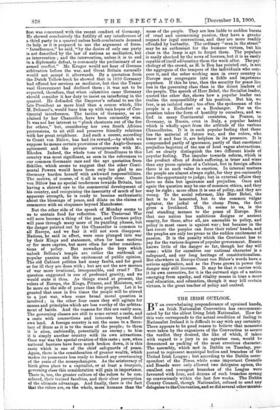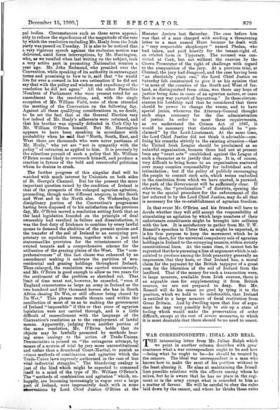THE IRISH OUTLOOK. B Y an overwhelming preponderance of upraised hands,
an Irish Nationalist Convention has excommuni- cated by far the ablest living Irish Nationalist. How far this vote corresponds to the actual condition of feeling in Nationalist Ireland it is difficult to say with any certainty. There appears to be good reason to believe that measures were taken by the organisers of the Convention to secure the verdict they desired, the like of which, if taken with regard to a jury in an agrarian case, would be denounced as packing of the most atrocious character. The assembly, which met in Dublin on Tuesday, pur- ported to represent municipal bodies and branches of the United Irish League ; but according to the Dublin corre- spondent of the Times, while some important Councils and Boards were only allowed two delegates apiece, the smallest and youngest branches of the League were favoured with four, and dozens of such branches sprang up conveniently within the last few weeks. The Dublin County Council, though Nationalist, refused to send any delegates to the Convention, and so did several other munici- pal bodies. Circumstances such as these serve appreci- ably to reduce the significance of the magnitude of the vote by which the resolution excluding Mr. Healy from the Irish party was passed on Tuesday. It is also to be noticed that a very vigorous speech against the exclusion motion was delivered, amid fierce interruptions, by Mr. Harrington, who, as we recalled when last writing on the subject, took a very active part in promoting Nationalist reunion a year ago. Mr. John Redmond, who presided over the Convention, while speaking of its authority in extravagant terms and promising to bow to it, said that " he would live for ever a coward in his own estimation if he did not say that with the policy and wisdom and expediency of the resolution he did not agree." All the other Parnellite Members of Parliament who were present voted for an amendment to the resolution, and, with the single exception of Mr. William Field, none of them attended the meeting of the Convention on the following day. Against all these qualifying considerations is, no doubt, to be set the fact that at the General Election very few indeed of Mr. Healy's adherents were returned, and that his brother was signally defeated in Cork City by Mr. William O'Brien himself. But Mr. Harrington appears to have been speaking in accordance with probability when he said that "North, South, East, and West there are thousands who were never partisans of Mr. Healy," who yet are " not in sympathy with the policy " of ostracism as applied to him. It is precisely by the relentless pursuit of such a policy that Mr. William O'Brien seems likely to overreach himself, and produce a reaction in favour of the bold and resourceful politician whom he desires to crush.
The further progress of this singular duel will be watched with much interest by Unionists on both sides of St. George's Channel. But for the present the more important question raised by the condition of Ireland is that of the prospects of the enlarged agrarian agitation, proceeding, though under different auspices, in the South and West and in the North also. On Wednesday, the disciplinary portion of the Convention's programme having been disposed of to his satisfaction on the previous day, Mr. O'Brien moved a resolution setting forth that as the land legislation founded on the principle of dual ownership had resulted in failure and dissatisfaction, it was the first duty of Irishmen to combine by every lawful means to demand the abolition of the present system and the transfer of the soil of Ireland to an occupying pro- prietary on equitable terms, together with a just and statesmanlike provision for the reinstatement of the evicted tenants and a comprehensive scheme for the utilisation of the grazing plains of the West. The "com- prehensiveness " of this last clause was enhanced by an amendment making it embrace the partition of non- residential and grazing holdings throughout Ireland. Thus enlarged, the resolution was carried unanimously, and Mr. O'Brien is good enough to allow us two years for the settlement of the problem so sketched out. That limit of time must not, however, be exceeded, " even if England concentrates as large an army in Ireland as the two hundred and fifty thousand heroes she has in South Africa chasing De Wet, or still oftener being chased by De Wet." This phrase recalls threats used within the recollection of most of us as to making the government of Ireland "impossible" if this or that piece of agrarian legislation were not carried through, and is a little difficult of reconcilement with the language of the Convention's resolution as to the employment of lawful means. Apparently, judging from another portion of the same resolution, Mr. O'Brien holds that its objects may be lawfully promoted by methods bear- ing some analogy to the action of Trade-Unions. Denunciation is poured on " the outrageous attempt, by means of a system of trial by jury more unconstitutional and unfair than a drumhead Court-Martial, to punish as crimes methods of combination and agitation which the Trade-Union laws expressly authorised in the case of less vital industrial struggles." The blundering analogy is just of the kind which might be expected to commend itself to a mind of the type of Mr. William O'Brien's. The " methods of combination and agitation " which, un- happily, are becoming increasingly in vogue over a large part of Ireland, were impressively dealt with in some (observations by Lord Chief Justice O'Brien at the Munster Assizes last Saturday. The case before him was that of a man charged with sending a threatening letter to a man named Hunt because he dealt with a " very respectable shopkeeper " named Phelan, who had taken, and paid heavily for the tenant-right of, an evicted farm in Tipperary. The accused was con- victed at Cork, but not without the exercise by the Crown Prosecutor of the right of challenge with regard to the composition of the jury. At a previous trial, at Clonmel, the jury had disagreed, and the case having been an absolutely plain one," the Lord Chief Justice on Saturday felt constrained to give it as his opinion that " in none of the counties of the South and West of Ire- land, as distinguished from cities, was there any hope of justice being done in cases of an agrarian nature, or cases that in any way partook of boycotting." In these circum- stances his Lordship said that he considered that there should be power to change the venue, and to have special juries, whenever the Attorney-General thought such steps necessary for the due administration of justice. In order to meet these requirements, as we understand the Crimes Act of 1887, it would be necessary that districts should be " pro- claimed" by the Lord-Lieutenant. At the same time, the Lord Chief Justice did not think it advisable—con- fining his remarks strictly to the existing situation—that the United Irish League should be proclaimed as an unlawful organisation, because there had not at present been any "overt acts" established against the League of such a character as to justify that step. It is, of course, very difficult to bring home to an organisation scattered over many counties responsibility for individual acts of intimidation; but if the policy of publicly encouraging the people to commit such acts, which seems embodied in the resolution from which we have quoted, is pursued, the path of the Government will be sufficiently clear. If otherwise, the " proclamation " of districts, opening the way to the special procedure for the enforcement of the law referred to by the Lord Chief Justice, may do all that is necessary for the re-establishment of agrarian freedom.
In that event Mr. O'Brien and his friends will have to decide whether they will still accept the responsibility of stimulating an agitation by which large numbers of their unfortunate constituents might be brought into collision with the law. It is satisfactory to gather from Mr. T. W. Russell's speeches in Ulster that, as might be expected, it is his firm purpose to keep the movement which he is leading there, for the universal compulsory sale of agrarian holdings in Ireland to the occupying tenants, within strictly constitutional lines. At the same time, it cannot but be regretted that he is pursuing a line of argument which is cal- culated to produce among the Irish peasantry generally an impression that they have, or that Ireland has, a moral claim for the payment by the British taxpayer of a great sum for the liberation of the soil of Ireland from the landlord. That if the money for such a transaction were, in large measure, available from Irish sources, there is an arguable case for supplementing it from British sources, we are not prepared to deny. But Mr. Russell will do his cause no good by tying it to the position, which we hold to be indefensible, that Ireland is entitled to a large measure of fiscal restitution from Great Britain. And by dwelling upon that line of argu- ment he may very possibly help to stir up a state of feeling which would make the preservation of order difficult, except at the cost of severe measures, to which it is most desirable that there should be no need to resort.















































 Previous page
Previous page